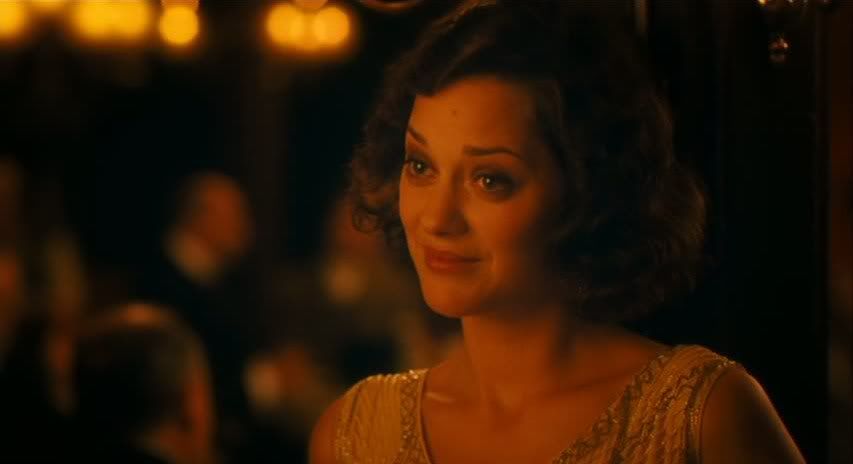
Midnight In Paris is the essence of recent Woody Allen in its purest form. This is a charming love letter to Paris, which opens with a series of crisply photographed, perfectly colored postcard images of Paris as a collection of tourist landmarks and street scenes that are familiar from the countless French movies they've appeared in. It's a glossy depiction of the latest destination on Woody's touristy trip through Europe, and this city in particular, Paris, seems to mean a great deal to him, as perhaps the place that appeals the most nakedly to the hopeless romantic in Woody.
The film hits all the usual Woody notes. Gil (Owen Wilson) is a successful screenwriter who's dissatisfied with his work and wants to be a serious novelist. He's in Paris with his fiancée Inez (Rachel McAdams), who he's feeling increasingly disconnected from, while his love of the city, his association of it with art and creativity, reawakens his dormant literary ambitions. This effect is intensified when Gil, sitting on a staircase around midnight, soaking in the atmosphere of Paris, is picked up by an old-fashioned car and transported back in time, to exactly the 1920s Parisian paradise that he'd been dreaming of. He is soon at parties with Scott and Zelda Fitzgerald (Tom Hiddleston and Alison Pill), Ernest Hemingway (Corey Stoll), Gertrude Stein (Kathy Bates), and many other luminaries of the multinational Paris cultural scene of the 20s. At a party, Cole Porter sings sadly and beautifully at the piano, flappers dance, and everything seems bathed in the golden glow of nostalgia. And then there's the lovely Adriana (Marion Cotillard), a young woman who's been a lover and muse for many painters of the time, most recently Pablo Picasso (Marcial di Fonzo Bo), and who Gil instantly falls for.
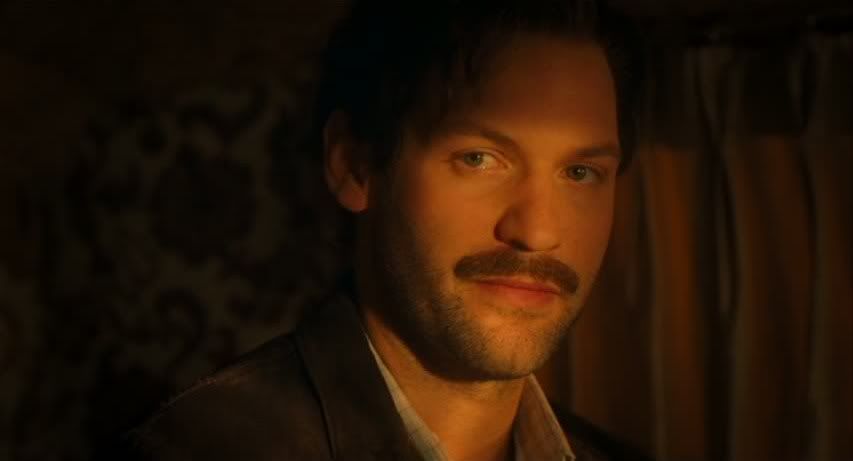
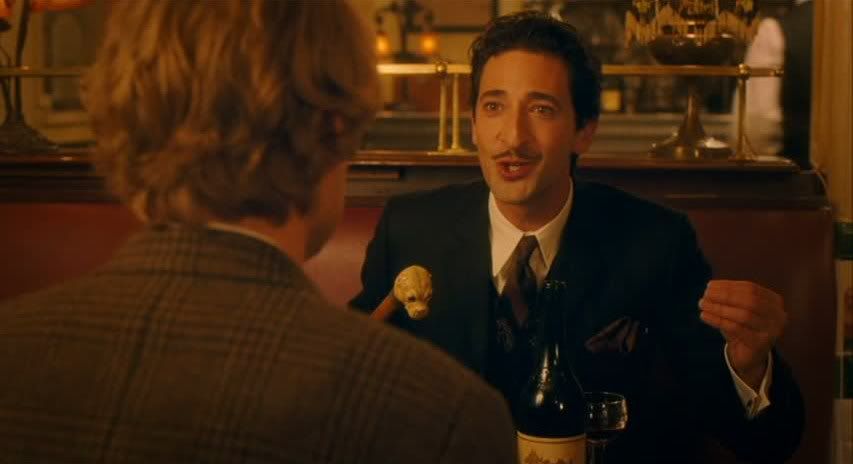
It's a very simple story, with a fantasy hook that delivers the very simple point that we always yearn for an ideal past that we never experienced and that never really existed. Such desires are an escape, an outlet for anxieties about the present, rooted in the inescapable feeling that if only one had been born earlier, or elsewhere, everything would feel so much more right. Woody realizes that this is a somewhat misguided desire but he can't help feeling it anyway, and he lovingly depicts 1920s Paris as a beautiful, perfect, charming place, even while gently nudging Gil towards the realization that the past can't offer solutions for the problems of the present. The film seems torn in two, its aesthetics delivering an unadulterated ode to the beauty and joys of the past while thematically it has to lead Gil to a place where he's happy to exist in the present, to live and create in his own time instead of aching for a past that will always seem sweeter than the familiar present.
Of course, it's no surprise that Woody is much more convincing in selling the past than the present. A big part of the film's pleasure comes from the offhanded sense of awe that Gil feels when he realizes that he's been pulled back in time, and his wide-eyed joy when encountering each new famed cultural figure of the past. Woody obviously has a lot of fun with depicting all these historical icons, who are surely the director's idols as much as they are Gil's. The best and most memorable of these personae is no doubt Stoll's perfectly pitched performance as Hemingway, who speaks exactly like he writes, in a clipped, assertive, no-nonsense tone that leaves little room for debate or uncertainties. He seems like the Hemingway we might imagine from his writing, come to life, speaking a perfectly phrased short story every time he opens his mouth, unleashing a series of terse, blunt phrases connected by chains of "and." Similarly effective, though in a much different mode, is Adrien Brody's Salvador Dalí, who mutters and slurs in multilingual argot and repeatedly announces his famous surname, always with an implied exclamation point and a grand sweep of his arm. He also introduces Gil to his friends Man Ray (Tom Cordier) and Buñuel (Adrien de Van), and Woody, hilariously, has Gil give Buñuel a movie plot idea, describing the surrealist premise of The Exterminating Angel, which puzzles Buñuel as much as it's puzzled and provoked audiences since he made it. It's a bit of a cutesy time travel gag but a charming one anyway.
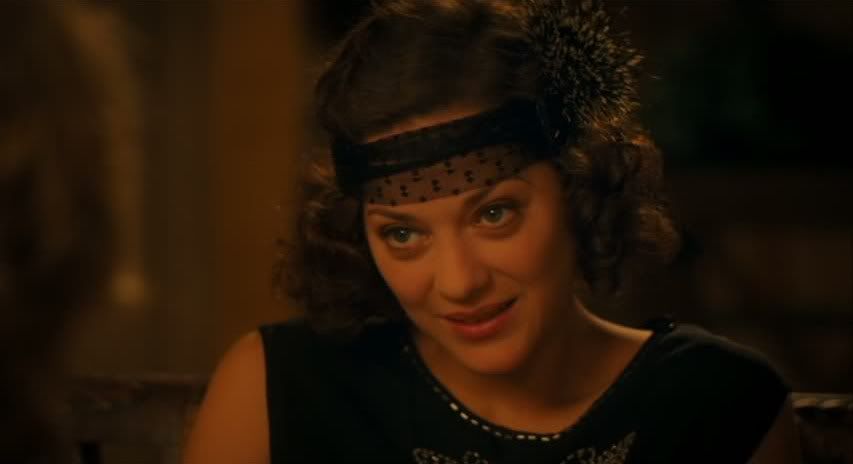
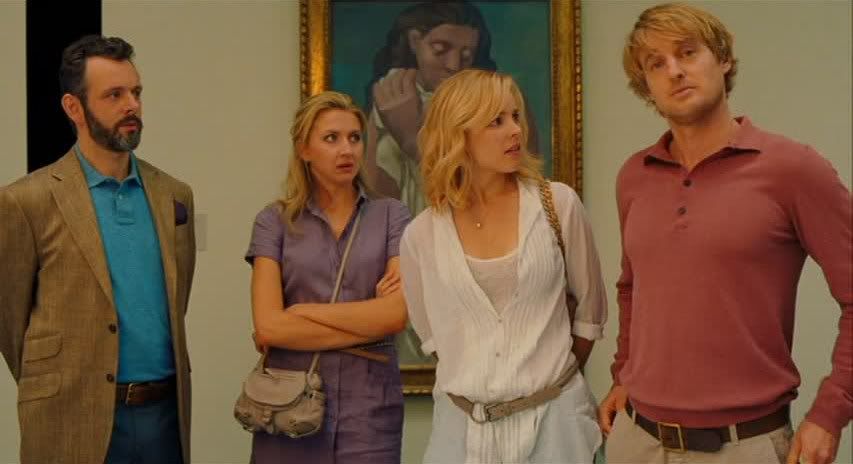
It's a shame that the modern story is comparatively slighted. Inez is distant and self-absorbed, and she and Gil are so clearly ill-suited for one another that it's hard to imagine how they ever got together. Her parents are used primarily for a few offhanded and easy-target swipes at Tea Party Republicans and Woody's favorite topic, clueless Americans. Woody at least seems to realize that he's being insufferable: right after Gil calls Republicans "lunatics" during a rambling rant about politics, he adds that it's okay, he can still respect those who don't think like him. Gil's present-day romantic resolution at the end of the film is also pretty unsatisfying, but maybe that's just because Cotillard's Adriana is so luminous, so sweet and smoldering, that nothing in the present seems very alluring in comparison, even Léa Seydoux's pretty but vague love interest. Maybe that's what Woody is going for here: a particular time is not tempting, ultimately, because of when it is, but because of who is there, because of the connections that one forms with other people. What Gil really learns, through his immediate and visceral connection with Adriana, is that what was lacking in his present was not necessarily a result of his era but the (lack of) genuine connections in his life.
This is a sweet, warm movie, much brighter and airier than anything Woody's made in a while. It's funny, too, though mostly at the expense of the hapless sorts who Woody sets up as targets for his mockery: the pompous Paul (Michael Sheen), who professes to be an expert on everything, and a private detective who Woody gives a minimal role seemingly just to set up the film's best and funniest throwaway time travel joke. As a bit of a meta joke, Woody even has Carla Bruni, the First Lady of France herself, appear as a tour guide, adding to the sense of this film as Woody's guide to Paris. Midnight In Paris is Woody at his most charming and romantic, quite a change from the darker, more cynical tone that's dominated most of his more recent films, both the successes like Vicky Cristina Barcelona and the more uneven efforts. It's a delicious confection, a magical realist treat that's all but impossible to resist.

11 comments:
This is not only one of Woody's best films in years it's his biggest hit to date. Celarly audicences who are bareyl familiar to Woddy Allen have warmed to this work and it's easy to see why. It evokes the great names of art and literature without condescension, and the device for time travel -- a taxi that maigically appears at Midnight -- is as clever as magic candies in Celine and Julie Go Boating. Over and above all there's Marion Cottillard -- one of the most magical of all actresses. Just her showing up brings a smile to my face. Even in a film as dramatically dire as Contagion She's got the gift and everyoen knows it.
Addtionally what makes the opening work so well is that we see these shots of Pariasian landmarks and city streets at different times of the day -- in sunlight and in rain. It's simply breathtaking film craftsmanship.
Ed,
Fine review sir and you hit all the key points I feel. Most people really like this movie, even my Dad who absolutely hates Woody Allen, loves this film. Perhaps that's an indication of why I wasn't in love with it like many others. I found it somewhat pat, and predictable albeit fun. Most of the impressions were just that, impressions. I like Owen Wilson, but didn't buy him at all as the writer. Rachel McAdams was not given a well written part. I was expecting a lot more here. I guess I'm one of the only ones who doesn't like it. Although I think our good friend Sam J also doesn't like it. I far prefer Vicky Cristina Barcelona to this one.
Yeah, it's a much more inviting film than anything Woody's made in a while, not nearly as cynical or dark as his other best work of recent years. Cotillard's a big part of why it's so charming of course, she lights up pretty much anything she does. And I love those opening postcard shots of Paris, shifting from day to night. It's really a lot of fun.
Jon, I can understand that response to some degree, and Rachel McAdams, like most of the present-day cast, didn't get much to do. That part of the movie's pretty undeveloped, so it's a good thing that Woody makes everything happening in the past so charming and compelling.
I ultimately prefer Vicky Cristina Barcelona as well - I think that's one of his very best movies ever - but this one is really great as well despite what are, for me, some minor quibbles that might bother you and others more.
Another wonderful review, Ed. Interesting to see someone who appears as naturally laid-back as Owen Wilson channeling Woody, which seems surprising at first but I think works very well. You make a great point about the present of the film feeling slightly underwritten compared to its warm evocation of the past - how on earth did Gil and Inez get together in the first place? All the same, I did enjoy the modern-day scenes too and in particular the insufferable Paul, whose supposed expertise about the past misses out just about everything that Gil discovers by actually going there!
I think Wilson works well because he is so different from Woody; too many of the previous Woody surrogates in his films tried to just copy the director's mannerisms and it could be distracting at times. The stuff with Paul was definitely funny and a highlight of the modern-day scenes.
With tacks and red string, you could create a web of connections between WA's movies' themes, phrases, character types, settings, situations, tones. In a very deep sense, his entire filmic body of work is one long movie. And this movie, to my ear, is most closely red-stringed with Everyone Says I Love You -- so light and charming and full of fantasy and longing and photogenic European locations. I love the mood both movies put me in.
Robert, I like the visual metaphor there - there's definitely tons of connections between all of Woody's pictures, he's got a very coherent set of obsessions and interests. Literary ambitions, male insecurity, infidelity, yep, this is a Woody Allen movie alright.
Everyone Says I Love You is a good call, mainly because it's also set in Paris and has a similarly affectionate perspective on Parisian landmarks. Some really nice scenes in that one.
Among the myriad scenes in his 40+ movies, some of the most natural, effusive ones are the Alda/Hawn/family scenes in ESILY -- and the remarkably real moments later in the film between Allen and Hawn. I'm always surprised she hasn't been in any more of his movies.
Yeah, Hawn is great in that. I especially love the gravity-defying dance between her and Woody, one of the most charming fantasy sequences in his career.
I loved that movie, too, and I wanted to rewatch it the minute it ended. I did not find Adriana so magical or impressive as everybody else seems to. I loved Owen Wilson, though, and everybody else in the 20's cast.
Great blog, by the way.
Post a Comment